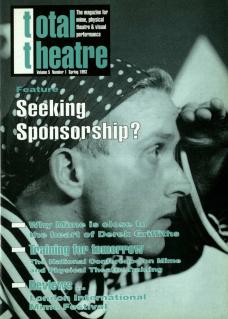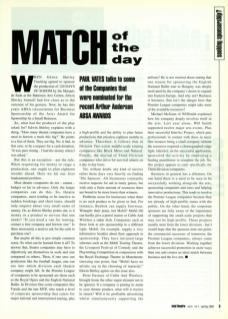When Edwin Shirley Trucking agreed to sponsor the production of 120 Days of Sodom by the Marquis de Sade at the Battersea Arts Centre, Edwin Shirley himself had few clues as to the outcome of his gesture. Now, he has this year’s ABSA (Association for Business Sponsorship of the Arts) Award for Sponsorship by a Small Business.
So, what had the producer of the play asked for? Edwin Shirley explains with a shrug. ‘How many theatre companies have a need to borrow a truck this big?’ He points to a line of them. They are big. No, it had, in this case, to be a request for a cash donation. ‘It was pure timing – I had the money when I was asked.’
But this is an exception – not the rule. When requesting for money to stage a production, one ought to plan eighteen months ahead. Here we hit our first fundamental problem.
Most theatre companies do not – cannot budget so far in advance. Only the larger companies can do this. So, theatre companies, most tending to be reactive to sudden bookings and short tours, should only inquire about very small sums of money. Or, as Edwin Shirley points out, is it money or a product or service that one needs? ‘If you need a van for touring, contact a hire company and borrow one.’ Is there necessarily a need to ask for the cash to purchase one?
But maybe all this is just simple common sense. So what can be learned from it all? To answer that, theatre companies may have to objectively see themselves in scale and size compared to others. Then, if one sees our profession like the football league, one can see into which division each theatre company might fall. In the Premier League of companies to be sponsored are those such as the Royal Opera and the English National Ballet. In Division One come companies like Trestle and the late MTP, who reach a level of corporate sponsorship that caters for major national and international touring, plus a high profile and the ability to plan future productions that priceless eighteen months in advance. Therefore, it follows that in Division Two exists middle-scale touring companies like Black Mime and Natural. Finally, the myriad of Third Division companies who strive for survival almost on a day to day basis.
Yet, without doubt, any kind of success relies these days very heavily on finding ‘The Sponsor’. All businesses constantly receive requests for aid in many guises, but with only a finite amount of resources there are bound to be more losers than winners.
Problems occur for businesses when there is no such product to be given or lent. For instance, Reebok can supply footwear, Wrangler their jeans, but Mobil? Mobil Oil can hardly give a petrol station or Cable And Wireless a radar dish. Companies such as these look at arts sponsorship in a different light. Mobil, for example, supply a very informative booklet about their approach to sponsorship. They have initiated large schemes such as the Mobil Touring Theatre, the Liverpool Festival of Comedy, and the Playwriting Competition in conjunction with the Royal Exchange Theatre in Manchester, stressing one point, that ‘Mobil have no artistic say in the choosing of material’. Edwin Shirley agrees on this issue also.
Peter Eustace, of Cable And Wireless, brought home the other major element not to be ignored. If a company is putting its name to your theatre product, what will it receive in return? Will it be profitable advertising whilst simultaneously supporting the artform? He is not worried about stating that one reason for sponsoring the English National Ballet tour to Hungary was deeply motivated by the company's desire to expand into Eastern Europe. And why not? Business is business. But isn't the danger here that Premier League companies might take most of the available resources?
Michael McGann of WHSmith explained how his company deeply involves itself in the arts. Last year alone, WHSmith supported twelve major arts events. Plus their successful InterAct Project, which puts professionals in contact with those in need. One instance being a small company without the resources required a choreographed stage fight. InterAct, on the successful application, sponsored the activity by employing a leading practitioner to complete the job. So, this project appears to cater specifically for Third Division companies.
Business in general has a dilemma. On one hand there is a need to be seen to be successfully working alongside the arts, sponsoring companies and tours and helping innovative productions. This tends to involve the Premier League companies because they are already of high-profile status with the public. On the other hand, the corporate sponsors are fully aware of the importance of supporting the small-scale projects that may not be high-profile. These projects usually stem from the lower divisions – but I would hope that the sponsors note one point: the commercial successes of tomorrow, the Premier League companies, always come from the lower divisions. Working together achieves successful promotion in more ways than one and creates an ideal match between business and the live arts.

